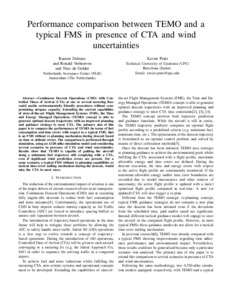Mostra el registre d'ítem simple
Performance comparison between TEMO and a typical FMS in presence of CTA and wind uncertainties
| dc.contributor.author | Dalmau Codina, Ramon |
| dc.contributor.author | Verhoeven, Ronald |
| dc.contributor.author | Gelder, Nico de |
| dc.contributor.author | Prats Menéndez, Xavier |
| dc.contributor.other | Universitat Politècnica de Catalunya. Departament de Física |
| dc.date.accessioned | 2017-03-10T18:27:33Z |
| dc.date.available | 2017-03-10T18:27:33Z |
| dc.date.issued | 2016 |
| dc.identifier.citation | Dalmau, R., Verhoeven, R., Gelder, N. de, Prats, X. Performance comparison between TEMO and a typical FMS in presence of CTA and wind uncertainties. A: Digital Avionics Systems Conference. "DASC 2016: 35 th Digital Avionics Systems Conference: Sacramento, USA: September 25-29, 2016: proceedings book". Sacramento: 2016, p. 1-8. |
| dc.identifier.uri | http://hdl.handle.net/2117/102342 |
| dc.description | © 2016 IEEE. Personal use of this material is permitted. Permission from IEEE must be obtained for all other uses, in any current or future media, including reprinting/republishing this material for advertising or promotional purposes, creating new collective works, for resale or redistribution to servers or lists, or reuse of any copyrighted component of this work in other works. |
| dc.description | Best session (Aiport Management & Arrival/Departure operations) paper award - 35th DASC. 2016 |
| dc.description.abstract | Continuous Descent Operations (CDO) with Con- trolled Times of Arrival (CTA) at one or several metering fixes could enable environmentally friendly procedures without com- promising airspace capacity. Extending the current capabilities of state-of-the-art Flight Management Systems (FMS), the Time and Energy Managed Operations (TEMO) concept is able to generate optimal descent trajectories with an improved planning and guidance strategy to meet CTA. The primary aim of this paper is to compare the performances of TEMO (in terms of fuel consumption and time error) with respect to a typical FMS, that is an FMS without re-planning mechanism during descent based on time or altitude errors. The comparison is performed through simulation, using an A320-alike simulation model and considering several scenarios in presence of CTA and wind uncertainties. Results show that TEMO is capable of guiding the aircraft along a minimum fuel trajectory still complying with a CTA, even if significant wind prediction errors are present. For a same scenario, a typical FMS without re-planning capabilities or tactical time-error nulling mechanism during the descent, would miss the CTA in most cases. |
| dc.format.extent | 8 p. |
| dc.language.iso | eng |
| dc.subject | Àrees temàtiques de la UPC::Física |
| dc.subject.lcsh | Airports -- Traffic control |
| dc.subject.lcsh | Airplanes -- Fuel |
| dc.title | Performance comparison between TEMO and a typical FMS in presence of CTA and wind uncertainties |
| dc.type | Conference report |
| dc.subject.lemac | Avions -- Combustibles |
| dc.subject.lemac | Trànsit aèri -- Control |
| dc.contributor.group | Universitat Politècnica de Catalunya. ICARUS - Intelligent Communications and Avionics for Robust Unmanned Aerial Systems |
| dc.identifier.doi | 10.1109/DASC.2016.7778067 |
| dc.description.peerreviewed | Peer Reviewed |
| dc.description.awardwinning | Award-winning |
| dc.rights.access | Open Access |
| local.identifier.drac | 19072383 |
| dc.description.version | Postprint (published version) |
| local.citation.author | Dalmau, R.; Verhoeven, R.; Gelder, N. de; Prats, X. |
| local.citation.contributor | Digital Avionics Systems Conference |
| local.citation.pubplace | Sacramento |
| local.citation.publicationName | DASC 2016: 35 th Digital Avionics Systems Conference: Sacramento, USA: September 25-29, 2016: proceedings book |
| local.citation.startingPage | 1 |
| local.citation.endingPage | 8 |


